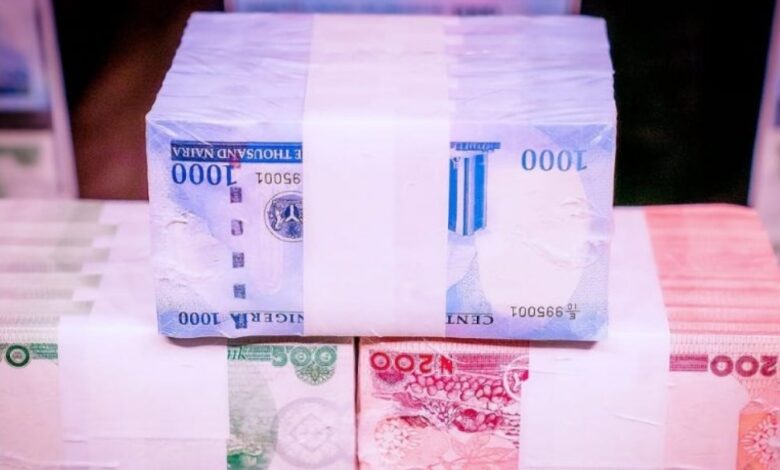Nigerian Govt’s Deadline On Old Currency Notes May Leave Citizens Poorer In Frontline Communities
The Nigerian government's redesign of its currency was meant to stem corruption and tackle the ransom industry, but Babagana Zulum, Borno state governor, says the timeframe for implementation could exacerbate people's sufferings. This has proven true from our interactions with rural dwellers.

Bukar Muhammed would rather return his five goats to Magumeri, his hometown, than sell them off in exchange for old currency notes at the livestock market in Maiduguri, Northeast Nigeria.
He and his sibling decided to sell off five of their livestock to get some new naira cash because back in Gubio, the locals had already started rejecting the old naira notes.
“For God’s sake, where will I be taking the old notes when they will soon be phased out?” Bukar asked.
“Anyone who needs my goats should either pay me with new naira notes, or I return them home in Magumeri until when the new money is available.”
Bukar said for about two weeks before the CBN deadline, people in his community have been rejecting the old N1000, N500, and N200 notes.
“People are terrified of losing their money, especially as most banks have no new notes to give. So you cannot blame us if we turn down transactions initiated with old notes,” he added.
Modu Sunoma, a trader in Gajiram, had stopped collecting the old naira notes because he doesn’t have a bank account.
The Nigerian government had, in Nov. 2022, unveiled redesigned currency notes of ₦1000, ₦500, and ₦200 denominations. The Central Bank of Nigeria (CBN) said it is empowered by the CBN Act of 2007 (as amended) to manage the country’s legal tender currency – Naira, Kobo, and eNaira in such a manner.
The CBN explained in its advocacy message for the acceptance of the new naira notes and the rationale behind the redesign that “Data have shown a large volume of banknote hoarding by the public, which has led to a shortage of clean and fit banknotes which has an increase in the rate of counterfeiting in the country and the long span of re-designation of naira notes, which according to best practice, should be undertaken every 5 to 8 years.”
The CBN said the current N200, N500, and N1,000 banknotes “will circulate side by side with the redesigned N200, N500, and N1,000 banknotes till January 31, 2023, when the current notes shall be withdrawn from circulation and cease to be legal tender.”
But there have been rising concerns that the deadline is too short and many citizens, especially those in rural areas with no commercial banks, may end up bankrupt.
Bakura Bundi, a trader at the Maiduguri abattoir and cattle market, told HumAngle that many villagers from the hinterland would rather bear the loss in transporting back their cattle than sell in exchange for old notes.
“People are already rejecting the old notes, especially the ruralites who don’t have bank accounts,” he said.
Aji Mohammed, a resident of Maiduguri-Bye-Pass, said his neighbour who operates a retail shop had rejected the N1000 note he handed him as payment for an item he bought from him.
“The man refused to collect my money because it was an old note,” Mohammed said. ”He said I should go with it and pay him anytime I get the new currency notes.”
In Gajigana, a village 53 km away from Maiduguri, farmers are willing to sell their farm produce at half the price as long as it would be paid for with new naira notes.
“We went to Gajigana to buy some beans, but traders there won’t sell because we had old notes. They are ready to sell for half the price if you have new naira notes.”

What may happen post-deadline
Babagana Zulum, the governor of Borno State, has warned that the humanitarian situation in his region could be worsened should the CBN go ahead to effect its new currency policy on January 31.
Borno State is currently trying to dust itself off the ashes of the Boko Haram conflict. This war took the best of nearly 14 years, leaving about 1.8 million people hungry and economically dislodged.
A delegation of CBN officials had last week visited the state on an advocacy mission to appease the populace on their seeming reluctance to welcome the new naira note. The team was also in the state to fashion out how the new cash notes could be taken to far-reaching locations in rural areas where IDPs could switch their old currency notes.
The CBN team told the governor that they intended to achieve the task within the final 10 days of January.
Governor Zulum listed several reasons the procedure could worsen the situation of the conflict-affected populace in Borno State.
“The policy is not a bad one because we need to move forward to embrace the issue of financial inclusion for all,” he noted.
“Gradually, our people will need to understand the importance of having accounts. But unfortunately, that will not be possible because out of the 27 local governments in Borno, only two local government areas have commercial banks – Maiduguri and Biu,” he said.
Zulum reminded the CBN that for them to move raw cash to the hinterlands; they also require the availability of the basic infrastructure to implement this policy.
“If you want to leave Maiduguri to any local government area, you can’t get an access road beyond 5km. What about telecommunications and internet systems? When people talk about 4G and 5G networks, you can’t get even 2G in most places.
“Go to Baga, for example; it is still inaccessible…Some peasant farmers who have ₦20,000 to open an account cannot come to Maiduguri and do so then go back in a day.
“For example, the Kala Balge local government’s headquarters has remained inaccessible for the last seven months. No single vehicle has been able to enter that place over the previous seven months. The terrain is wet; the soil is alluvial… How would the CBN take these new notes there in the remaining few days before the January deadline?
“The people there have to travel 16 km inside the water using canoes to get to where to buy food in Chadian border communities.”
Cash-based economy
Governor Zulum lamented that the insurgency has destroyed most of the state’s socio-economic infrastructure which further deepened poverty and illiteracy.
He said a state, Borno, that had just pulled out of the worst phase of an over a decade old insurgency and was lacking most of the enabling infrastructure should not be made to go through economic hardships that the “hurried” phasing out of old naira notes could bring upon the people.
The governor referenced places like Monguno, in the northern part of the state where only about 5000 of the more than 700,000 IDPs can use the ATM on their own.
He said in locations like Mafa, a town 45 km away from the state capital, residents still find it difficult to send text messages and get instant delivery due to poor telecommunication service.
Wondering why the CBN is unwilling to listen to the masses, the governor said rather than its making policies to ease the difficulty of the generality of the people; the changed notes will undoubtedly make life more difficult for our people in fragile states like Borno.
Support Our Journalism
There are millions of ordinary people affected by conflict in Africa whose stories are missing in the mainstream media. HumAngle is determined to tell those challenging and under-reported stories, hoping that the people impacted by these conflicts will find the safety and security they deserve.
To ensure that we continue to provide public service coverage, we have a small favour to ask you. We want you to be part of our journalistic endeavour by contributing a token to us.
Your donation will further promote a robust, free, and independent media.
Donate HereStay Closer To The Stories That Matter




